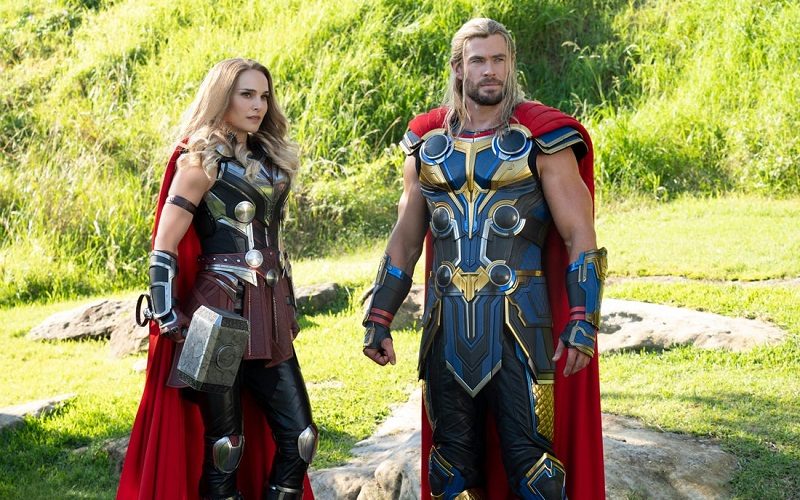Thor: Love and Thunder (Waititi, 2022)
Thor: Love and Thunder tackles the themes of love and faith, but I’m not 100% confident that the filmmakers at Disney and Marvel understand either of these themes. Otherwise, how could they create a film about gods that discredits faith? This irony does not escape me. Meanwhile, this same film advocates that you “choose love,” but that it is important to “feel sh***y” in order to experience that love. If you’re confused, you’re not alone.
Gorr (Christian Bale, The Dark Knight, Ford v Ferrari) has lost his daughter because the calloused god he worships ignored him. That god, in fact, enjoyed his suffering. In a rage, Gorr gains possession of the Necro Sword — the one weapon that can kill gods. Now, with the sword’s cursed power, Gorr devotes his life to taking revenge and killing every god in the universe — earning the name The God Butcher. This new threat brings an out-of-shape Thor (Chris Hemsworth, The Avengers, Thor: Ragnorok) out of retirement, so he can protect those he loves. With help from Valkyrie (Tessa Thompson, Creed, Annihilation) and Korg (Taika Waititi, What We Do in the Shadows, Thor: Ragnorok), Thor reunites with his former love Jane Foster (Natalie Portman, Black Swan, V for Vendetta) in an attempt to stop Gorr’s mission of vengeance. This adventure spans planets, universes, and afterlives.
I can’t help but think Thor: Love and Thunder is an atheist’s perspective of theism. As contradictory as that sounds, it’s just as contradictory in the film. On one hand, the film has colorful, silly humor with Thor and his cohorts, but on the other hand, it has the dark, colorless (literally) evil surrounding Gorr. The gods are portrayed as selfish and uncaring with the same weaknesses as mortals. The movie paints them as villains but still relies on them to right the wrongs. There is a wonderful, exciting moment where children wield superpowers, but the film’s tone is too frightening and inappropriate for most kids to enjoy this act of heroism.
Thor: Love and Thunder aims to recapture the magic of its predecessor Thor: Ragnorok, which was very funny. However, in this chapter, the jokes rarely land. The normally charming leads practically beg you to laugh at their one-liners with little success. For all the silliness in the early Marvel movies, the themes were grounded in reality. Iron Man dealt with terrorism in the Middle East. Captain America: The First Avenger faced the horrors of World War II. Even the original Thor is a fish-out-of-water comedy with the titular Norse god rescuing humans in our current-day culture. These recent MCU installments have no foundation to which the audience can relate. As a result, we can’t understand the rules of the gaudy worlds they have created, and we lose interest.
There are some really cool moments in Thor: Love and Thunder: 1) a tense battle depleted of color, 2) a truly funny cameo by an A-lister Hollywood star, and 3) giant screaming goats. Unfortunately, the lack of cohesion makes it difficult to engage with this film and, frankly, makes it frustrating to watch. I don’t think the filmmakers understand the themes they are highlighting, and I’m losing faith in their ability to connect with their audience beyond their shrinking die-hard base.
Bonus Coverage: See David and Ken discuss the themes of faith and deities in this video podcast from YouTube:
https://www.youtube.com/watch?v=um6ZycNlxZ8

